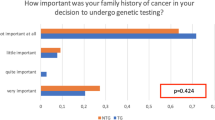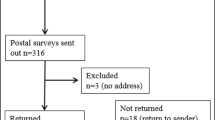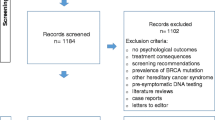Abstract
Few studies have quantitatively evaluated the uptake and outcomes of BRCA1/2 genetic counseling and testing in men. We conducted a prospective longitudinal study to describe and compare uptake of and psychosocial outcomes following BRCA1/2 testing in a sample of men and women at high-risk for carrying a BRCA1/2 mutation. Men (n = 98) and women (n = 243) unaffected with cancer completed baseline assessments prior to genetic counseling and testing and then 6- and 12-months post-testing. Most men (n = 94; 95.9%) opted to have genetic testing, of whom 44 received positive BRCA1/2 genetic test results and 50 received true negative results. Among women, 93.4% had genetic testing, of whom 79 received positive results and 148 received negative results. In multivariate models, male BRCA1/2 carriers reported significantly higher genetic testing distress (6-months: Z = 4.48, P < 0.0001; 12-months: Z = 2.78, P < 0.01) than male non-carriers. After controlling for baseline levels of distress, no statistically significant differences emerged between male and female BRCA1/2 carriers in psychological distress at 12-months post-testing, although absolute differences were evident over time. Predictors of distress related to genetic testing among male carriers at 12-months included higher baseline cancer-specific distress (Z = 4.73, P < 0.0001) and being unmarried (Z = 2.18, P < 0.05). Similarly, baseline cancer-specific distress was independently associated with cancer-specific distress at 6- (Z = 3.66, P < 0.001) and 12-months (Z = 4.44, P < 0.0001) post-testing among male carriers. Clinically, our results suggest that pre-test assessment of distress and creation of educational materials specifically tailored to the needs and concerns of male carriers may be appropriate in this important but understudied high-risk group.



Similar content being viewed by others
References
Ford D, Easton DF, Stratton M et al (1998) Genetic heterogeneity and penetrance analysis of the BRCA1 and BRCA2 genes in breast cancer families. The Breast Cancer Linkage Consortium. Am J Hum Genet 62:676–689
Juan AS, Wakefield CE, Kasparian NA, Kirk J, Tyler J, Tucker K (2008) Development and pilot testing of a decision aid for men considering genetic testing for breast and/or ovarian cancer-related mutations (BRCA1/2). Genet Test 12:523–532
Antoniou A, Pharoah PD, Narod S et al (2003) Average risks of breast and ovarian cancer associated with BRCA1 or BRCA2 mutations detected in case series unselected for family history: a combined analysis of 22 studies. Am J Hum Genet 72:1117–1130
Chen S, Parmigiani G (2007) Meta-analysis of BRCA1 and BRCA2 penetrance. J Clin Oncol 25:1329–1333
National Comprehensive Cancer Network (2010) NCCN Clinical Practice Guidelines in Oncology. Genetic/Familial High-Risk Assessment: Breast and Ovarian–v.1.2010. Accessed 12/3/10 from http://www.nccn.org/professionals/physician_gls/PDF/genetics_screening.pdf
The Breast Cancer Linkage Consortium (1999) Cancer risks in BRCA2 mutation carriers. J Natl Cancer Inst 91:1310–1316
Mitra AV, Bancroft EK, Barbachano Y et al (2010) Targeted prostate cancer screening in men with mutations in BRCA1 and BRCA2 detects aggressive prostate cancer: preliminary analysis of the results of the IMPACT study. BJU Int. doi: 10.1111/j.1464-410X.2010.09648.x
Liede A, Karlan BY, Narod SA (2004) Cancer risks for male carriers of germline mutations in BRCA1 or BRCA2: a review of the literature. J Clin Oncol 22:735–742
Thompson D, Easton DF, Breast Cancer Linkage Consortium (2002) Cancer incidence in BRCA1 mutation carriers. J Natl Cancer Inst 94:1358–1365
Thompson D, Easton D, Breast Cancer Linkage Consortium (2001) Variation in cancer risks, by mutation position, in BRCA2 mutation carriers. Am J Hum Genet 68:410–419
Graves KD, Schwartz MD (2008) Psychological and behavioral impact of genetic testing. In: Isaacs C, Rebbeck TR (eds) Hereditary breast cancer: risk, prevention, and management. Informa Healthcare, New York, pp 255–275
Hamilton JG, Lobel M, Moyer A (2009) Emotional distress following genetic testing for hereditary breast and ovarian cancer: a meta-analytic review. Health Psychol 28:510–518
Meiser B, Halliday JL (2002) What is the impact of genetic counselling in women at increased risk of developing hereditary breast cancer? A meta-analytic review. Soc Sci Med 54:1463–1470
Foster C, Watson M, Eeles R et al (2007) Predictive genetic testing for BRCA1/2 in a UK clinical cohort: three-years follow-up. Br J Cancer 96:718–724
van Oostrom I, Meijers-Heijboer H, Lodder LN et al (2003) Long-term psychological impact of carrying a BRCA1/2 mutation and prophylactic surgery: a 5-years follow-up study. J Clin Oncol 21:3867–3874
d’Agincourt-Canning L (2001) Experiences of genetic risk: disclosure and the gendering of responsibility. Bioethics 15:231–247
Goelen G, Rigo A, Bonduelle M, De Greve J (1999) Moral concerns of different types of patients in clinical BRCA1/2 gene mutation testing. J Clin Oncol 17:1595–1600
Hallowell N, Ardern-Jones A, Eeles R et al (2005) Men’s decision-making about predictive BRCA1/2 testing: the role of family. J Genet Couns 14:207–217
Daly MB (2009) The impact of social roles on the experience of men in BRCA1/2 families: implications for counseling. J Genet Couns 18:42–48
Daly PA, Nolan C, Green A et al (2003) Predictive testing for BRCA1 and 2 mutations: a male contribution. Ann Oncol 14:549–553
Dudok De Wit AC, Tibben A, Frets PG, Meijers-Heijboer EJ, Devilee P, Niermeijer MF (1996) Males at-risk for the BRCA1 gene, the psychological impact. Psychooncology 5:251–257
Liede A, Metcalfe K, Hanna D et al (2000) Evaluation of the needs of male carriers of mutations in BRCA1 or BRCA2 who have undergone genetic counseling. Am J Hum Genet 67:1494–1504
Denayer L, Boogaerts A, Philippe K, Legius E, Evers-Kiebooms G (2009) BRCA1/2 predictive testing and gender: uptake, motivation and psychological characteristics. Genet Couns 20:293–305
Lodder L, Frets PG, Trijsburg RW et al (2001) Men at risk of being a mutation carrier for hereditary breast/ovarian cancer: an exploration of attitudes and psychological functioning during genetic testing. Eur J Hum Genet 9:492–500
Lynch HT, Lemon SJ, Durham C et al (1997) A descriptive study of BRCA1 testing and reactions to disclosure of test results. Cancer 79:2219–2228
Smith KR, West JA, Croyle RT, Botkin JR (1999) Familial context of genetic testing for cancer susceptibility: moderating effect of siblings’ test results on psychological distress one to two weeks after BRCA1 mutation testing. Cancer Epidemiol Biomarkers Prev 8:385–392
Watson M, Foster C, Eeles R et al (2004) Psychosocial impact of breast/ovarian (BRCA1/2) cancer-predictive genetic testing in a UK multi-centre clinical cohort. Br J Cancer 91:1787–1794
Schwartz MD, Valdimarsdottir HB, DeMarco TA et al (2009) Randomized trial of a decision aid for BRCA1/BRCA2 mutation carriers: impact on measures of decision making and satisfaction. Health Psychol 28:11–19
Horowitz M, Wilner N, Alvarez W (1979) Impact of Event Scale: a measure of subjective stress. Psychosom Med 41:209–218
Derogatis LR, Melisaratos N (1983) The brief symptom inventory: an introductory report. Psychol Med 13:595–605
Zabora J, BrintzenhofeSzoc K, Curbow B, Hooker C, Piantadosi S (2001) The prevalence of psychological distress by cancer site. Psychooncology 10:19–28
Cella D, Hughes C, Peterman A et al (2002) A brief assessment of concerns associated with genetic testing for cancer: the multidimensional impact of cancer risk assessment (MICRA) questionnaire. Health Psychol 21:564–572
Finlay E, Stopfer JE, Burlingame E et al (2008) Factors determining dissemination of results and uptake of genetic testing in families with known BRCA1/2 mutations. Genet Test 12:81–91
Schwartz MD, Peshkin BN, Hughes C, Main D, Isaacs C, Lerman C (2002) Impact of BRCA1/BRCA2 mutation testing on psychologic distress in a clinic-based sample. J Clin Oncol 20:514–520
Smith AW, Dougall AL, Posluszny DM, Somers TJ, Rubinstein WS, Baum A (2008) Psychological distress and quality of life associated with genetic testing for breast cancer risk. Psychooncology 17:767–773
Wagner TM, Moslinger R, Langbauer G et al (2000) Attitude towards prophylactic surgery and effects of genetic counselling in families with BRCA mutations. Austrian Hereditary Breast and Ovarian Cancer Group. Br J Cancer 82:1249–1253
Meiser B, Butow P, Friedlander M et al (2002) Psychological impact of genetic testing in women from high-risk breast cancer families. Eur J Cancer 38:2025–2031
Tercyak KP, Lerman C, Peshkin BN et al (2001) Effects of coping style and BRCA1 and BRCA2 test results on anxiety among women participating in genetic counseling and testing for breast and ovarian cancer risk. Health Psychol 20:217–222
Graves KD, Peshkin BN, Halbert CH, DeMarco TA, Isaacs C, Schwartz MD (2007) Predictors and outcomes of contralateral prophylactic mastectomy among breast cancer survivors. Breast Cancer Res Treat 104:321–329
Ertmanski S, Metcalfe K, Trempala J et al (2009) Identification of patients at high risk of psychological distress after BRCA1 genetic testing. Genet Test Mol Biomarkers 13:325–330
Schlich-Bakker KJ, ten Kroode HF, Ausems MG (2006) A literature review of the psychological impact of genetic testing on breast cancer patients. Patient Educ Couns 62:13–20
Graves KD, Wenzel L, Schwartz MD et al (2010) Randomized controlled trial of a psychosocial telephone counseling intervention in BRCA1 and BRCA2 mutation carriers. Cancer Epidemiol Biomarkers Prev 19:648–654
Acknowledgments
This study is Supported by National Cancer Institute Grants K07 CA131172 (KDG), R01 CA01846 (MDS), U56 CA101429 (Peter Shields) and The Jess and Mildred Fisher Center for Familial Cancer Research.
Author information
Authors and Affiliations
Corresponding author
Rights and permissions
About this article
Cite this article
Graves, K.D., Gatammah, R., Peshkin, B.N. et al. BRCA1/2 genetic testing uptake and psychosocial outcomes in men. Familial Cancer 10, 213–223 (2011). https://doi.org/10.1007/s10689-011-9425-2
Published:
Issue Date:
DOI: https://doi.org/10.1007/s10689-011-9425-2




